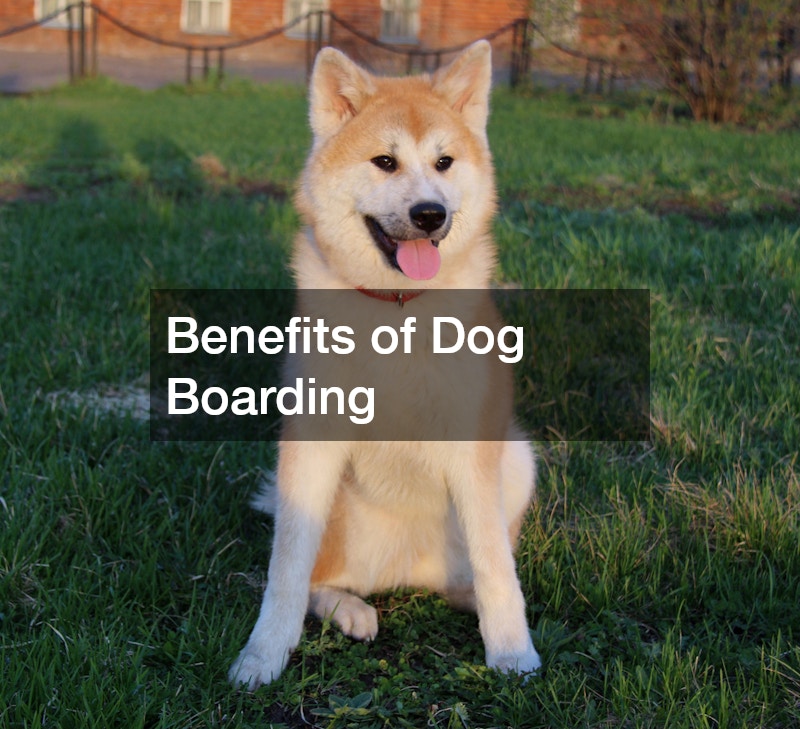
Leaving your dog behind while traveling can be stressful. Whether it’s a weekend trip or an extended vacation, ensuring your dog is safe, happy, and well-cared-for is a top priority. That’s where dog boarding comes in. More than just a kennel, today’s boarding facilities offer a range of services designed to provide comfort, stimulation, and peace of mind. If you’re considering dog boarding for the first time or looking to switch to a better option, here’s everything you need to know to make the right choice.
What Is Dog Boarding?
Dog boarding is a service where your dog stays at a facility designed specifically for the temporary care of pets. While you’re away, trained staff provide your dog with food, water, regular bathroom breaks, playtime, and sometimes even grooming or training services.
Facilities can range from traditional kennels to luxury pet resorts, with varying levels of amenities and accommodations.
Types of Dog Boarding Facilities
Not all dog boarding options are the same. Depending on your dog’s personality and needs, one type may suit better than another:
-
Traditional Kennels: These typically consist of individual indoor or indoor/outdoor runs. Dogs have a designated space and are let out for scheduled exercise or bathroom breaks.
-
Pet Resorts or Luxury Boarding: These facilities often offer cage-free environments, doggy daycare-style playtime, soft bedding, and even webcams so you can check in remotely.
-
In-Home Boarding: Some services place your dog with a host family or pet sitter who cares for them in a home setting. This can be ideal for dogs who are nervous in busy environments.
-
Veterinary Boarding: Many animal hospitals offer boarding, which is a good option for pets with medical conditions or those who require regular medications.
What to Look for in a Dog Boarding Facility
Choosing the right dog boarding facility is important for your dog’s health and comfort. When evaluating options, consider the following:
-
Cleanliness and Safety: The environment should be clean, secure, and well-maintained. Look for secure fencing, proper ventilation, and no strong odors.
-
Trained Staff: Staff should be experienced in pet care, capable of handling emergencies, and attentive to signs of stress or illness in dogs.
-
Exercise and Socialization: Dogs should be given ample time to move, play, and interact—either with people or with other dogs, depending on your dog’s comfort level.
-
Feeding and Medication: Confirm that the facility will stick to your dog’s feeding schedule and is equipped to administer any required medications.
-
Vaccination Requirements: Reputable facilities require proof of up-to-date vaccinations, including rabies, bordetella, and distemper. This helps protect your dog and others from illness.
-
Emergency Procedures: Ask about protocols for medical emergencies, including nearby veterinary access.
Preparing Your Dog for Boarding
Preparation can make the boarding experience smoother for both you and your dog:
-
Visit Beforehand: Schedule a tour of the facility to see how your dog reacts to the environment. Some places offer trial days or short stays to help ease the transition.
-
Pack Familiar Items: Bringing your dog’s bed, toys, or a favorite blanket can help ease anxiety by giving them something familiar from home.
-
Stick to a Routine: Leading up to the boarding stay, keep feeding, walking, and playtime consistent so your dog feels stable.
-
Leave Contact Information: Provide emergency contact numbers, your veterinarian’s information, and a backup contact in case you’re unreachable.
-
Communicate Needs Clearly: Inform the staff about any medical issues, behavioral quirks, or special routines that can help them care for your dog properly.
Benefits of Dog Boarding
Boarding your dog at a trusted facility offers several advantages:
-
Socialization: Dogs often enjoy the chance to play and interact with other pets and people, especially in group play settings.
-
Consistent Care: Scheduled feeding, walking, and attention from trained professionals can be more consistent than relying on friends or neighbors.
-
Reduced Anxiety for Owners: Knowing your pet is safe in a controlled environment offers peace of mind while you’re away.
-
Medical Oversight: Some facilities have staff trained in pet first aid or on-call veterinarians, which can be especially reassuring if your dog has health concerns.
Questions to Ask Before Booking
Before making a final decision, here are some helpful questions to ask:
-
What is the daily schedule like?
-
How many staff members are on-site at any time?
-
Are the dogs supervised during play?
-
What’s the staff-to-dog ratio?
-
Are updates or photos provided during the stay?
The answers will help you assess whether a facility is the right fit for your dog’s temperament and needs.
Dog boarding doesn’t have to be a source of stress. When done right, it’s a positive experience that keeps your dog safe, active, and cared for while you’re away. By choosing a facility that fits your dog’s personality and preparing ahead of time, you can travel with peace of mind—knowing your furry friend is in good hands.
